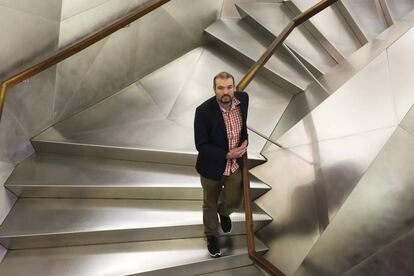Catalan astronomer discovers habitable planet close to our Solar System
Proxima Centauri b is the nearest exoplanet to Earth and may be covered with water


The Catalan astronomer Guillem Anglada-Escudé (Ullastrell,1979) has discovered a habitable planet, which would be the closest habitable planet known to our solar system. The exoplanet, named Proxima Centauri b, orbits around Proxima Centauri, the nearest star to the Solar System, which is located about 4.2 light-years from the Earth and emits a dimmer light in comparison to our Sun. The planet has a similar size to the Earth, and although the environment there is very different from the Solar System, the conditions for habitability seem to be good.
When the discoverer Anglada-Escudé was asked if there were any chances of finding life at Centuari B, he answered that the probabilities “are not null and are higher than at the gas giants, for example.” He also said that one of the first questions that should be answered is if there is liquid water on the surface, because that would explain a lot about how the atmosphere could change with the presence of life.
However, it is not known yet what conditions or atmosphere this planet has. One hypothesis, according to Anglada-Escudé, is that it could be “an ocean world.” The planet could be completely filled with water, with ice continents at the cool part, similar to the Arctic; and with a big ocean in the warmer part, with a depth that could reach 300 kilometers.
With current technology, it would still take 30,000 years to reach Proxima Centauri b. However, a group of scientists and philanthropists say they will be able to get spacecraft to the closest planetary system to Earth in a few decades. With this ambition, the Breakthrough Starshot project – supported by Stephen Hawking, Mark Zuckerberg and Yuri Milner – is aiming to develop nanoships that would weigh only a few grams. These objects would move with laser light and would be able to arrive in Proxima Centauri star in about 20 years. Before that, it may take another 20 years to develop all the necessary technology. The initiative counts on funds of $100 million.
Guillem Anglada-Escudé is Professor of Astrophysics of the Queen Mary University of London. His field of study is focused on accurate techniques for detecting planets and has participated in several research projects. He is leading the group that discovered the Proxima Centauri b.
Most of his research is based on the detection and characterization of the Earth-like planets closer to the Solar System. "The observation of these planets offer unique information to answer fundamental questions such as the origin of life, how terrestrial planets were formed and how they evolved over time", he stated during an interview.
Guillem Anglada-Escudé also had his own ambitions to focus his research on those possible habitable planets: “Planets are places that you can imagine and find things nobody has found before.”
English version by Laerke Saura and Sergio Segura
elpais.cat in English
From November onward, the Catalan edition of EL PAÍS, Elpais.cat, will include a selection of news stories in English.
The texts will be prepared by journalism students at the Pomepeu Fabra University (UPF), who will be adapting content from Catalan current affairs every week, adding extra information and explanation to these stories so that they can be understood in a global context.
Tu suscripción se está usando en otro dispositivo
¿Quieres añadir otro usuario a tu suscripción?
Si continúas leyendo en este dispositivo, no se podrá leer en el otro.
FlechaTu suscripción se está usando en otro dispositivo y solo puedes acceder a EL PAÍS desde un dispositivo a la vez.
Si quieres compartir tu cuenta, cambia tu suscripción a la modalidad Premium, así podrás añadir otro usuario. Cada uno accederá con su propia cuenta de email, lo que os permitirá personalizar vuestra experiencia en EL PAÍS.
¿Tienes una suscripción de empresa? Accede aquí para contratar más cuentas.
En el caso de no saber quién está usando tu cuenta, te recomendamos cambiar tu contraseña aquí.
Si decides continuar compartiendo tu cuenta, este mensaje se mostrará en tu dispositivo y en el de la otra persona que está usando tu cuenta de forma indefinida, afectando a tu experiencia de lectura. Puedes consultar aquí los términos y condiciones de la suscripción digital.








































